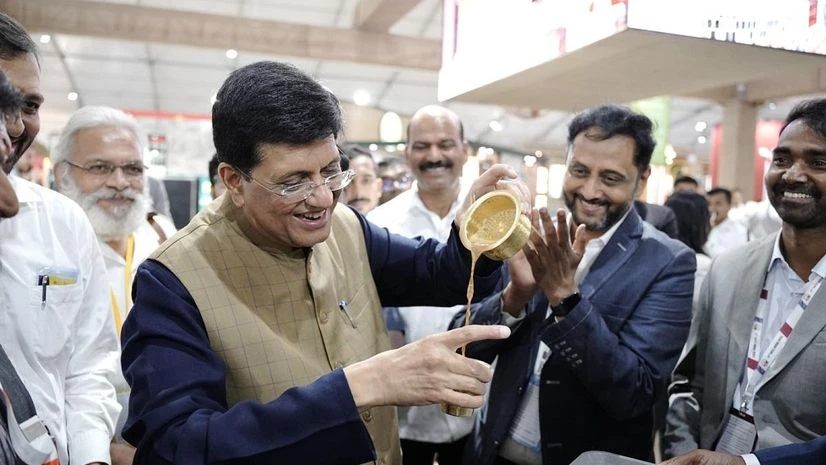Jagadeesha added that there is a lot of opportunity for coffee in India, because we have a very low coffee-drinking base.

Coffee opportunities in India are very high. Despite the high price, Indian coffee is most preferred globally. The increasing number of cafes and coffee joints show that coffee is no longer a beverage, but an experience. Cafes have transformed into work stations for startups and this is good for the Indian economy, said Dr KJ Jagadeesha, CEO and Secretary, Coffee Board, in a conversation with the editors and staff of The New Sunday Express. Excerpts of the interview:
Tell us about the coffee scenario and the pricing concerns ….
Coffee in India is doing well, especially over the last three years, but we are not the price setters. Reason being, India’s overall contribution is around 4%. Brazil and Vietnam contribute 60% of the global production, and they set the price. But in the last few years there is supply disruption in Brazil and there is a shortage in supply globally. So, we are happy as Indian coffee is getting a good price. India is the 7th largest in terms of production and 5th largest in exports.
Can you please explain about exports?
Our exports are better than our production. We export, re-import and export all our coffee. Most of the instant coffee is made from coffee imported from cheaper destinations. Not a single Indian coffee bean is left unsold. There is very high demand for Indian coffee that even if we double production, traders say they will sell it. Indian coffees are expensive because they are grown under shade. Unlike in other countries like Brazil where it is open cultivation. When you grow under shade, coffee production is less by around 50%. But the quality is very good. This coffee takes longer to mature and has some unique characteristics that are not present in other coffee.
How is the coffee export business?
Around 80-90% of coffee is exported as green coffee. Green coffee can be kept for a year and usually, roasted coffee lasts only 15 days. Beyond that, the quality comes down. We export green coffee and then the seller blends it with different beans to get different notes. We export to 120 countries. Europe is our biggest market. We export about 60% of coffee grown here.
What about the rising number of private, instant and star-rated cafés and types of coffees served?
I am happy they are increasing. There is a lot of opportunity for coffee in India, because we have a very low coffee-drinking base. In other countries, people drink 8-9 kg of coffee per annum, per capita, but we are 50-100 grams. People who are getting into coffee now are the new generation who feel coffee is the most affectionate and fashionable drink. They love to drink coffee even if it’s high priced. They drink coffee for the experience. Ambience should be great and products should be innovative. They don’t like drinking the same coffee every day. Cafes now have become work spaces where people exchange ideas and conduct business. Many start-ups are running their businesses or whole companies from these cafes. This is how we expect and want the coffee industry to grow. Growers will get better prices, employment will be generated and GDP will get a boost.
How does coffee compete with tea?
Tea and coffee are complementary beverages, not competitors. Consumers typically don’t switch between them. Coffee consumption, especially among the younger generation, is on the rise. Tea remains affordable and easy to make, while making quality coffee requires skill. Many aren’t aware that if coffee is boiled above 90 degrees Celsius, it’s a waste. In future, skill-based courses will be introduced for over one lakh self-help women’s groups, and also 5,000 college graduates will be trained.
What is the situation in Karnataka?
Karnataka is a leader in Indian coffee production, accounting for around 70%, though we have 50% of the area. In the last 3-5 years, the crop has been reasonably good and prices too.
Hasn’t climate change affected coffee production?
It has, as coffee is a sensitive crop. Even if there is a 15-day delay in rainfall, during March and April, the crop gets affected to a large extent. Climate change is something that needs to be taken seriously and addressed. The Coffee Board has taken several measures to address it like bringing some climate-resilient varieties, training farmers and providing incentives.
Did drought affect coffee plantations?
Drought effect was relatively low. The reason is that even if there is a 50% reduction in rainfall, coffee will still grow. The yield might be less, but 800-900 mm of rainfall is enough for the plantation and the impact has been minimal.
Which is the best variety of coffee?
While there are many varieties, one of the best is Chandragiri. Farmers also say that it is superior compared to any other variety across the globe. The yield is good and it is resistant to most of the rust viruses. The cupping quality is very good.
What about collaborative research?
Research should not be restricted to scientists and labs. It should be a joint effort between growers and scientists. Work on this started 2-3 years ago and we have identified elite robusta plants. Growers and scientists together shortlisted around 60-70 of them and found 8-10 varieties promising. They will be released as tissue culture and MoUs are being signed.
How many varieties do we have?
Right now eight have been developed in collaboration with farmers. Otherwise coffee has many varieties. Some 28 varieties have been given to us by private firms. There are cases where a variety does well in other countries, but not in India.
Do we have more varieties when compared to other countries?
Brazil may have more varieties than us. Other than Brazil, we have more. It does not mean anything. Farmers prefer the leading variety. We have also kept some varieties for cupping. If somebody says that I want quality and I am not worried about production then we have Selection 5 and 9 varieties. These two are excellent in cupping and taste.
What are the proposals before the Coffee Board in the coming days?
We have developed a new plan and it has been submitted to the government. It includes many things. To address labour shortage there is a plan for mechanisation. Second is quality improvement. Many say Indian coffee is excellent on the plant. But after harvesting, since it is poorly handled, quality dips. Importance is being given to harvesting and storing. Fermentation is important. It is done using different techniques to get different aromas. We are also looking at franchising India Coffee Houses to rural areas.
Are you also planning to add more coffee varieties to India Coffee Houses to compete with private players?
Coffee Board is a nodal agency to promote coffee as a sector. India Coffee Houses are not meant for competing. Given that there are a lot of nostalgic memories about them and people love to come there, we are working on expanding the menu. At the Queen’s Road Coffee House, the Board has collaborated with a social organisation that deals with specially-abled people. We complement each other.
How do people perceive the addition of chicory in coffee, considering its potential health implications?
The debate around chicory’s health impact exists. Chicory was brought in during the Second World War to meet the rising demand among soldiers when production was less. It continues to be blended even now. However, coffee has various health benefits. It’s beneficial for the heart and kidney, apart from being a refreshment. When chicory is mixed, the benefits of coffee get diluted.
How has urbanisation impacted coffee production?
Urbanisation is affecting everything, but its effect on coffee production is relatively limited due to the remote locations where coffee is typically grown.
How is the Board addressing man-elephant conflict?
It poses a significant challenge in coffee-growing regions, causing fear among residents and reluctance among labourers. The Board is actively engaging with the forest department and other authorities to address these issues.
Are there any courses being offered by the Board related to coffee for graduates?
We offer postgraduate diploma programmes and short courses focused on coffee, covering topics including cafe management and coffee trading.
What are the byproducts derived from coffee beans?
The use of coffee beans in the cosmetic industry is increasing. The leaf and pulp are used for skincare and makeup products. The leftover coffee after brewing is also used in making byproducts.
How many farmers are involved in the coffee industry, and is this number expected to increase?
There are about 4.7 lakh farmers working currently in India and it will increase in the coming years.
Are coffee plantations primarily done by small-scale farmers, or is there a monopoly in the industry?
It is a myth that coffee plantations are managed by affluent farmers. The reality is that 99% of the plantations are managed by small-scale farmers. Only around 1% of farmers are considered large growers but they occupy around 30% of the land.
What do you say about coffee tours gaining popularity?
Coffee tourism is gaining traction, providing coffee growers with an additional source of income. However, it’s crucial for both tourists and growers to responsibly manage activities to ensure minimal impact on the ecosystem as regions where coffee is grown are in Western and Eastern Ghats.
What other types of businesses can be done with coffee besides opening a coffee shop?
People can establish their own coffee brand with their estate, offer consultancy services, provide technology solutions such as market information, engage in trading and roasting and explore businesses centered around deriving coffee byproducts.
Coffee Board has also ventured online and started selling, how has that progressed?
Customers came to the Board and requested us to start e-commerce so that they could easily purchase online. Today we have entire operations in the basement which has a roastery, grinder and 24×7 packing staff. As soon as we get an order we pack it and dispatch it. The initiative is doing well.
Does the Board have enough staff or are there too many vacancies?
There are of course limitations to hiring more staff. Currently, we have a vacancy of 50 people with a total sanctioned strength of 587. We are looking to expand in the north eastern regions and we need a lot of people to convince farmers, educate them and handle estates. We are also looking at promotion both in domestic and international events to build the brand value of Indian coffee and its quality.
Can coffee be grown on terrace gardens?
Coffee plants can be grown anywhere, outdoors or inside homes, however, it will not yield commercially viable beans or fruits. Some might have berries too but when you roast it and make a cup of coffee it doesn’t taste like coffee. Coffee requires an elevation of more than 500 metres above sea level and secondly, the rainfall has to be good. It also requires optimum shade to grow.
How successful was the coffee festival in terms of partnerships with other players?
We had more than 20-30 international brands who were present, around 200-300 Indian brands participated and around 400-500 buyer-sellers met formally. Strong relations were built that not just last for one year but go on for decades, once the buyer finds the perfect blend for himself there is no going back.
What do you want to say to youngsters who want to start a coffee business?
Coffee is a very passionate profession. I’ve seen people who make a profit not because they’re working for it but it’s about passion. They like growing coffee and living on the estate. I have seen Baristas who are passionate about making better coffee every day, they enjoy it.
source: http://www.newindianexpress.com / The New Indian Express / Home> Karnataka / by Express News Service / February 11th, 2024
)






